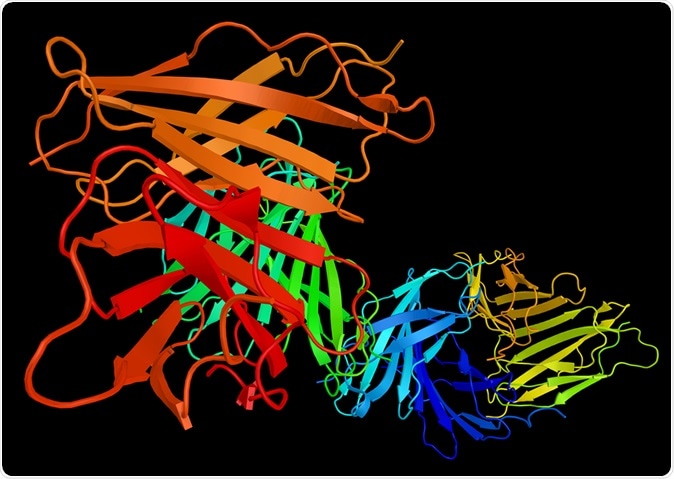According to a large worldwide study, the hormone that is produced in the body during exercise called irisin, can prevent and delay the onset of mental faculty decline and Alzheimer’s disease. The results of the study were published in the latest issue of the journal Nature Medicine.

Irisin, a cleaved version of FNDC5. Promotes conversion of white fat tissue to brown. Image Credit: ibreakstock / Shutterstock
Irisin is produced within the muscles during intense exercise and physical activity. It was six years back and was found to be instrumental in burning fat. Irisin has been on the cards for obesity researchers worldwide for its potential to help reduce fat. In these latest studies on mice and humans, researchers have found that irisin helps protect against mental decline that is commonly seen with aging process. This study by Fernana de Felice at the Federal University of Rio de Janerio and colleagues, proves the adage the regular exercise keeps the body as well as mind healthy.
Neurobiologist Professor Ottavio Arancio, from the Columbia University and this study’s lead researcher said, “Irisin could comprise an attractive novel therapy aimed to prevent dementia in patients at risk.” He said that irisin can delay the “progression in patients at the later stages - including those who can no longer exercise.” He explained, “Many patients with dementia are disabled due to other age-related conditions or co-morbidities - for example arthritis, heart disease, obesity, visual problems, depression - that preclude them from engaging in regular physical exercise. Therefore, the development of alternative approaches that build on the beneficial effects of exercise in the brain may benefit those patients.”
In this study the team studied a gene called the FNDC5. This gene regulates the formation of irisin. They switched off this gene in the lab mice. This effectively stopped the production of irisin. These animals showed problems of learning and memory progressively, they noted. The switched on the FNDC5 gene in the mice to see that the brain cells had restored function. The team also studied brain tissues and blood and spinal fluids of people who had died of dementia. They compared this with blood samples and spinal fluid samples of living healthy matches who did not have dementia. The team found that patients with Alzheimer’s gradually lose the synapses of connections of the brain and this causes loss of memory. Irisin is found to restore these synapses.
According to Dr James Pickett, head of research at Alzheimer's Society, “Although this study was only in mice, it adds to mounting evidence of the relationship between lifestyle factors, like physical fitness, and dementia. This is a promising avenue for more research and potentially new therapies in future. We know that exercise can decrease a person's risk of developing dementia, but still have lots to learn about its effect on cognitive decline - for example, we need to know how this hormone gets into the brain, how it works, whether it is effective in people, and whether it affects men and women in the same way - which is why we're funding a long-term study of 700 middle-aged people at risk of dementia to better understand these links.” He explained that there have been no new drugs for dementia in the last one and half decades and this study can show a new avenue of research in tackling dementia and Alzheimer’s disease. “We know that exercise not only helps people with dementia to manage certain side-effects but also reduces the risk of developing the condition, which gives us all more motivation for those New Year’s Resolutions to get fit and healthy,” he said. Rosa Sancho at the charity Alzheimer’s Research UK added, “We know that physical activity is linked to better brain health as we age, and this research highlights a biological mechanism that may contribute to this beneficial effect.” At present 35 million people worldwide who are suffering from age related dementia and Alzheimer’s disease.
Prof Arancio said, “Defective brain hormonal signalling has been associated with Alzheimer’s disease, a disorder characterised by synapse and memory failure. By showing irisin is an important mediator of the beneficial effects of exercise in Alzheimer's disease models our findings place it as a novel agent capable of opposing synapse failure and memory impairment.” He added, “Bolstering brain irisin levels - either pharmacologically or through exercise - may thus constitute a novel therapeutic strategy to protect and repair synapse function and prevent cognitive decline in Alzheimer's disease.”